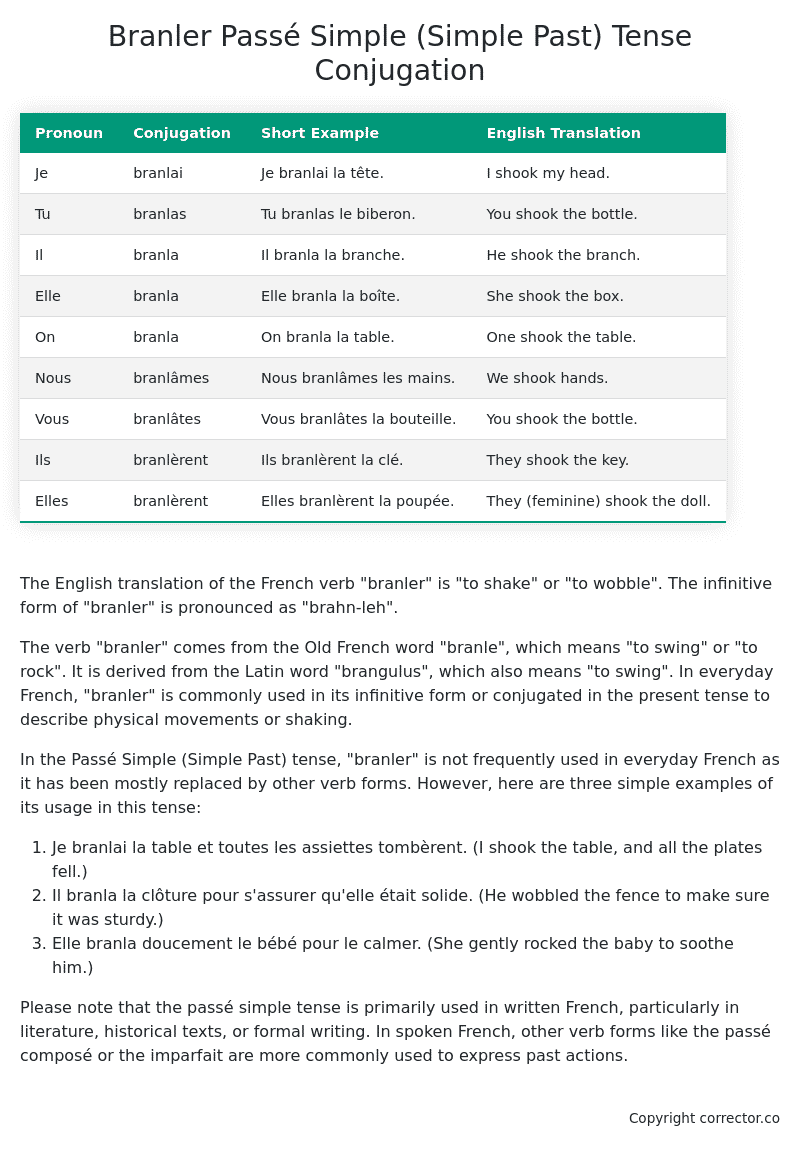Passé Simple (Simple Past) Tense Conjugation of the French Verb branler
Introduction to the verb branler
The English translation of the French verb “branler” is “to shake” or “to wobble”. The infinitive form of “branler” is pronounced as “brahn-leh”.
The verb “branler” comes from the Old French word “branle”, which means “to swing” or “to rock”. It is derived from the Latin word “brangulus”, which also means “to swing”. In everyday French, “branler” is commonly used in its infinitive form or conjugated in the present tense to describe physical movements or shaking.
In the Passé Simple (Simple Past) tense, “branler” is not frequently used in everyday French as it has been mostly replaced by other verb forms. However, here are three simple examples of its usage in this tense:
- Je branlai la table et toutes les assiettes tombèrent.
(I shook the table, and all the plates fell.) - Il branla la clôture pour s’assurer qu’elle était solide.
(He wobbled the fence to make sure it was sturdy.) - Elle branla doucement le bébé pour le calmer.
(She gently rocked the baby to soothe him.)
Please note that the passé simple tense is primarily used in written French, particularly in literature, historical texts, or formal writing. In spoken French, other verb forms like the passé composé or the imparfait are more commonly used to express past actions.
Table of the Passé Simple (Simple Past) Tense Conjugation of branler
| Pronoun | Conjugation | Short Example | English Translation |
|---|---|---|---|
| Je | branlai | Je branlai la tête. | I shook my head. |
| Tu | branlas | Tu branlas le biberon. | You shook the bottle. |
| Il | branla | Il branla la branche. | He shook the branch. |
| Elle | branla | Elle branla la boîte. | She shook the box. |
| On | branla | On branla la table. | One shook the table. |
| Nous | branlâmes | Nous branlâmes les mains. | We shook hands. |
| Vous | branlâtes | Vous branlâtes la bouteille. | You shook the bottle. |
| Ils | branlèrent | Ils branlèrent la clé. | They shook the key. |
| Elles | branlèrent | Elles branlèrent la poupée. | They (feminine) shook the doll. |
Other Conjugations for Branler.
Le Present (Present Tense) Conjugation of the French Verb branler
Imparfait (Imperfect) Tense Conjugation of the French Verb branler
Passé Simple (Simple Past) Tense Conjugation of the French Verb branler (You’re reading it right now!)
Passé Composé (Present Perfect) Tense Conjugation of the French Verb branler
Futur Simple (Simple Future) Tense Conjugation of the French Verb branler
Futur Proche (Near Future) Tense Conjugation of the French Verb branler
Plus-que-parfait (Pluperfect) Tense Conjugation of the French Verb branler
Passé Antérieur (Past Anterior) Tense Conjugation of the French Verb branler
Futur Antérieur (Future Anterior) Tense Conjugation of the French Verb branler
Subjonctif Présent (Subjunctive Present) Tense Conjugation of the French Verb branler
Subjonctif Passé (Subjunctive Past) Tense Conjugation of the French Verb branler
Subjonctif Imparfait (Subjunctive Imperfect) Tense Conjugation of the French Verb branler
Subjonctif Plus-que-parfait (Subjunctive Pluperfect) Tense Conjugation of the French Verb branler
Conditionnel Présent (Conditional Present) Tense Conjugation of the French Verb branler
Conditionnel Passé (Conditional Past) Tense Conjugation of the French Verb branler
Conditionnel Passé II (Conditional Past II) Tense Conjugation of the French Verb branler
L’impératif Présent (Imperative Present) Tense Conjugation of the French Verb branler
L’impératif Passé (Imperative Past) Tense Conjugation of the French Verb branler
L’infinitif Présent (Infinitive Present) Tense Conjugation of the French Verb branler
L’infinitif Passé (Infinitive Past) Tense Conjugation of the French Verb branler
Le Participe Présent (Present Participle) Tense Conjugation of the French Verb branler
Le Participe Passé (Past Participle) Tense Conjugation of the French Verb branler
Struggling with French verbs or the language in general? Why not use our free French Grammar Checker – no registration required!
Get a FREE Download Study Sheet of this Conjugation 🔥
Simply right click the image below, click “save image” and get your free reference for the branler Passé Simple tense conjugation!

Branler – About the French Passé Simple (Simple Past) Tense
Formation
Usage
Narration
Historical Context
Interactions with other tenses
Passé Composé
Imparfait
Conditional and Subjunctive
Summary
I hope you enjoyed this article on the verb branler. Still in a learning mood? Check out another TOTALLY random French verb conjugation!


